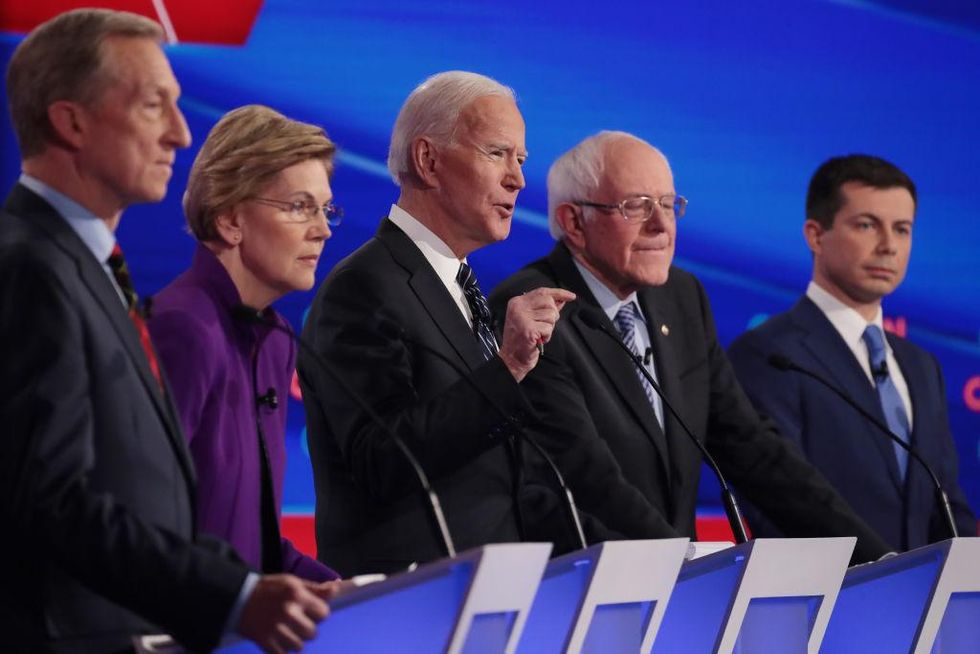
When the Democratic National Committee convenes its winter meeting on Thursday in Philadelphia, a key agenda item will be rubber-stamping Joe Biden’s manipulation of next year’s presidential primaries. There’ll be speeches galore, including one by Biden as a prelude to his expected announcement that he’ll seek a second term. The gathering will exude confidence, at least in public. But if Biden were truly confident that Democratic voters want him to be the 2024 nominee, he wouldn’t have intervened in the DNC’s scheduling of early primaries.
New polling underscores why Biden is so eager to bump New Hampshire from the first-in-the-nation spot that it has held for more than 100 years. In the state, “two-thirds of likely Democratic primary voters don’t want President Joe Biden to seek re-election,” the UNH Survey Center found. “Biden is statistically tied with several 2020 rivals, including Transportation Secretary Pete Buttigieg, Massachusetts Senator Elizabeth Warren and Vermont Senator Bernie Sanders, all of whom are more personally popular than Biden among likely Democratic primary voters in New Hampshire.”
Dismal as Biden’s showing was in the new poll, it was a step up from his actual vote total in New Hampshire’s 2020 primary, when he came in fifth with 8 percent of the vote. No wonder Biden doesn’t want the state to go first and potentially set primary dominoes falling against him.
Keen to reduce the chances of a major primary challenge next year, Biden sent a letter to the DNC in early December insisting on a new schedule — demoting New Hampshire to a second spot, alongside Nevada, while giving the leadoff slot to South Carolina. Democratic Party energy and funds will be squandered in that deep-red state, which is about as likely to give its electoral votes to the 2024 Democratic ticket as Ron DeSantis is likely to donate the money in his campaign coffers to the Movement for Black Lives.
But South Carolina, the state with the lowest rate of unionization in the country, offers the singular virtue of having rescued Biden’s presidential hopes with its 2020 primary. As the Associated Press explained last week, Biden is “seeking to reward South Carolina, where nearly 27 percent of the population is Black, after a decisive win there revived his 2020 presidential campaign following losses it suffered in Iowa, New Hampshire and Nevada.”
The president’s rationalization for putting South Carolina first is diversity. Yet the neighboring purple state of Georgia, which has an activist Democratic base, is more racially diverse — and it’s a crucial swing state, where the party’s general-election prospects would benefit from being the first-in-the-nation presidential primary.
Biden’s intervention has created a long-term political mess for Democrats in New Hampshire, where he’s now less popular than ever due to undermining the state’s first-primary status. Even New Hampshire’s normally compliant Democratic senators and representatives in Congress have been denouncing the move. Biden’s maneuver has boosted the chances that the Democratic ticket will lose the state’s four electoral votes this time around.
But Biden having his way with the Democratic National Committee is a slam dunk because he supplies the ball, hires the referees, owns the nets and controls the concession stands. While cowed DNC members dribble at his behest, substantial concerns will echo outside the range of officials’ whistles.
As a Don’t Run Joe full-page ad in The Hill newspaper pointed out last week (full disclosure: I helped write it), “There are ample indications that having Joe Biden at the top of ballots across the country in autumn 2024 would bring enormous political vulnerabilities for the ticket and for down-ballot races.”
But so far, like the Democrats in Congress, members of the DNC have indicated much more concern about avoiding the ire of the Biden White House than avoiding the probable grim outcome of a Biden ’24 campaign. By the time the DNC adjourns on Saturday, news reports will be filled with on-the-record statements from members lauding Biden’s leadership with next year’s elections on the horizon. Conformity prevails.
But warning signs are profuse. Among the latest are results of a YouGov poll released days ago: “Just 34 percent of Americans describe Biden as honest and trustworthy — a new low for his presidency. That’s an 8-point drop from when this question was last asked in December 2022, prior to the public revelation that classified documents had been found in Biden’s possession.”
This is the electoral horse that Democrats are supposed to be riding into battle against the extremist Republican Party next year. The national Democratic Party is locked into operating at the whim of a president now believed to be “honest and trustworthy” by only one-third of U.S. adults.
How all this will play out at the DNC meeting is hardly a mystery. Yet many members surely know that Biden is likely to be a weak candidate if he goes ahead with proclaimed plans to run for re-election. The hope is that the GOP will defeat itself as an extremist party in disarray. But it would be irresponsible to gamble on such a scenario by rolling dice loaded with Biden.




